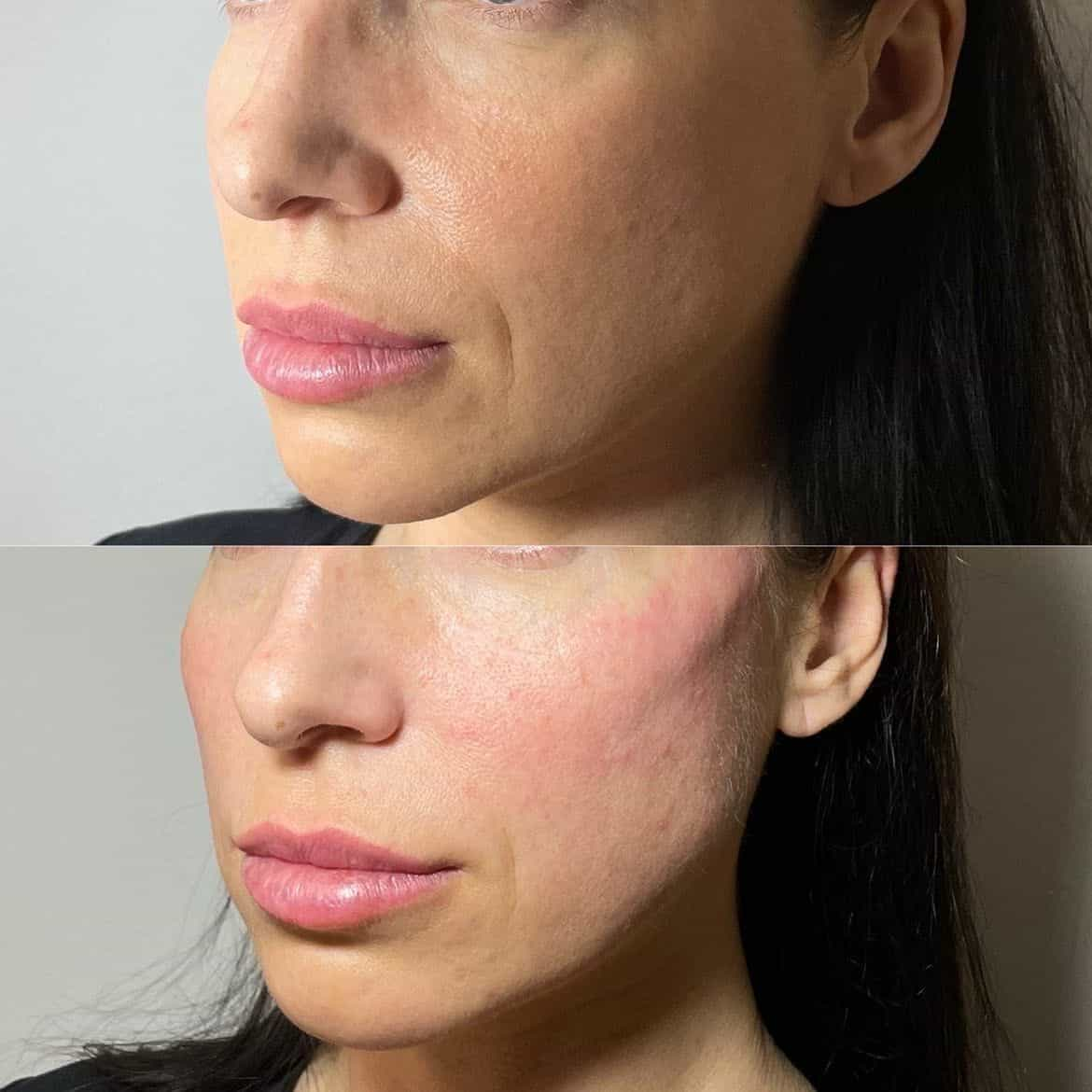Possible Causes
When your mouth corners droop, it can be a sign of various factors ranging from simple muscle fatigue to underlying medical conditions. Understanding the potential causes behind this phenomenon can help you determine the best course of action for addressing it.
Muscle Weakness
Muscle weakness in the face, leading to drooping mouth corners, can stem from a variety of causes.
One common cause is facial muscle fatigue, often resulting from prolonged frowning or smiling, or overuse from certain activities like playing wind instruments.
Neurological conditions, such as Bell’s palsy or stroke, can also impair facial nerve function, leading to muscle weakness and drooping. Other potential causes include vitamin deficiencies (particularly B vitamins), thyroid disorders, and autoimmune diseases. Additionally, medications like antidepressants and antipsychotics can sometimes cause this side effect.
Emotional Stress
Muscle weakness in the face, leading to drooping mouth corners, can stem from a variety of causes.
One common cause is facial muscle fatigue, often resulting from prolonged frowning or smiling, or overuse from certain activities like playing wind instruments.
Neurological conditions, such as Bell’s palsy or stroke, can also impair facial nerve function, leading to muscle weakness and drooping. Other potential causes include vitamin deficiencies (particularly B vitamins), thyroid disorders, and autoimmune diseases. Additionally, medications like antidepressants and antipsychotics can sometimes cause this side effect.
Medical Conditions
Muscle weakness in the face, leading to drooping mouth corners, can stem from a variety of causes.
One common cause is facial muscle fatigue, often resulting from prolonged frowning or smiling, or overuse from certain activities like playing wind instruments.
Neurological conditions, such as Bell’s palsy or stroke, can also impair facial nerve function, leading to muscle weakness and drooping. Other potential causes include vitamin deficiencies (particularly B vitamins), thyroid disorders, and autoimmune diseases.
Additionally, medications like antidepressants and antipsychotics can sometimes cause this side effect.
Addressing the Issue
Drooping mouth corners, also known as downturned mouth, can have various underlying causes. Understanding these causes is crucial for determining the appropriate course of action.
Identifying the Root Cause
Identifying the root cause of drooping mouth corners is essential for effective treatment. Facial muscle fatigue, often resulting from prolonged frowning or excessive smiling, is a common culprit. Certain activities like playing wind instruments can also lead to muscle overuse and fatigue. Neurological conditions such as Bell’s palsy or stroke can impair facial nerve function, causing weakness and drooping.
Vitamin deficiencies, particularly those involving B vitamins, can contribute to muscle weakness. Thyroid disorders and autoimmune diseases are also potential underlying causes. Furthermore, some medications, including antidepressants and antipsychotics, may have this as a side effect.
Lifestyle Changes

Addressing drooping mouth corners involves identifying the underlying cause. For facial muscle fatigue, techniques like massage, stretching exercises, and practicing neutral facial expressions can help alleviate the issue.
If neurological conditions are suspected, seeking medical attention for diagnosis and treatment is crucial. Vitamin deficiencies can be addressed through dietary changes or supplementation under the guidance of a healthcare professional. Managing thyroid disorders and autoimmune diseases through appropriate medical care is essential.
It’s important to discuss any potential side effects with your doctor if you suspect medications are contributing to drooping mouth corners.
Diet and Nutrition
Dietary choices can play a role in addressing muscle weakness, including the kind that leads to drooping mouth corners. A balanced diet rich in essential nutrients is crucial for overall health and muscle function.
Ensure adequate intake of B vitamins, particularly B12 and niacin, as deficiencies can contribute to muscle weakness. Good sources include lean meats, poultry, fish, eggs, dairy products, legumes, and leafy green vegetables.

Protein is also essential for muscle building and repair. Include protein sources like meat, poultry, fish, beans, lentils, tofu, and nuts in your diet.
Staying hydrated is important for optimal bodily functions, including muscle function. Drink plenty of water throughout the day.
Exercise
Addressing drooping mouth corners requires a multifaceted approach that considers potential underlying causes.
Lifestyle modifications can be beneficial. Managing stress through techniques like meditation or yoga may help alleviate facial muscle tension. Practicing relaxation exercises and consciously relaxing facial muscles throughout the day can also contribute to improvement.
In some cases, seeking professional help might be necessary. Consulting a doctor or dentist can help rule out underlying medical conditions and provide personalized advice.
A physical therapist specializing in facial rehabilitation can offer targeted exercises and techniques to strengthen facial muscles and improve function.
Medical Treatment
Drooping mouth corners, also known as downturned mouth, can have various underlying causes. Understanding these causes is crucial for determining the appropriate course of action.
Identifying the root cause of drooping mouth corners is essential for effective treatment. Facial muscle fatigue, often resulting from prolonged frowning or excessive smiling, is a common culprit. Certain activities like playing wind instruments can also lead to muscle overuse and fatigue. Neurological conditions such as Bell’s palsy or stroke can impair facial nerve function, causing weakness and drooping.
Vitamin deficiencies, particularly those involving B vitamins, can contribute to muscle weakness. Thyroid disorders and autoimmune diseases are also potential underlying causes. Furthermore, some medications, including antidepressants and antipsychotics, may have this as a side effect.
Addressing drooping mouth corners involves identifying the underlying cause. For facial muscle fatigue, techniques like massage, stretching exercises, and practicing neutral facial expressions can help alleviate the issue.
If neurological conditions are suspected, seeking medical attention for diagnosis and treatment is crucial. Vitamin deficiencies can be addressed through dietary changes or supplementation under the guidance of a healthcare professional. Managing thyroid disorders and autoimmune diseases through appropriate medical care is essential.
It’s important to discuss any potential side effects with your doctor if you suspect medications are contributing to drooping mouth corners.
Self-Care Practices
Drooping mouth corners, also known as downturned mouth, can be a cause of concern and may signal underlying issues.
Facial Exercises
Drooping mouth corners, also known as downturned mouth, can have various underlying causes. Understanding these causes is crucial for determining the appropriate course of action.
- Facial muscle fatigue:
- Neurological conditions:
- Vitamin deficiencies:
- Thyroid disorders and autoimmune diseases:
- Medications:
This is a common cause, often resulting from prolonged frowning or excessive smiling. Certain activities like playing wind instruments can also lead to muscle overuse and fatigue.
Bell’s palsy or stroke can impair facial nerve function, causing weakness and drooping.
B vitamin deficiencies, particularly B12 and niacin, can contribute to muscle weakness.
These conditions can also affect muscle function and lead to drooping mouth corners.
Some medications, including antidepressants and antipsychotics, may have this as a side effect.

Stress Management Techniques
Drooping mouth corners, also known as downturned mouth, can be a cause of concern and may signal underlying issues. Understanding the potential causes behind this phenomenon can help you determine the best course of action for addressing it.
Addressing drooping mouth corners involves identifying the underlying cause. For facial muscle fatigue, techniques like massage, stretching exercises, and practicing neutral facial expressions can help alleviate the issue.
If neurological conditions are suspected, seeking medical attention for diagnosis and treatment is crucial. Vitamin deficiencies can be addressed through dietary changes or supplementation under the guidance of a healthcare professional. Managing thyroid disorders and autoimmune diseases through appropriate medical care is essential. It’s important to discuss any potential side effects with your doctor if you suspect medications are contributing to drooping mouth corners.
Dietary choices can play a role in addressing muscle weakness, including the kind that leads to drooping mouth corners. A balanced diet rich in essential nutrients is crucial for overall health and muscle function.
Ensure adequate intake of B vitamins, particularly B12 and niacin, as deficiencies can contribute to muscle weakness. Good sources include lean meats, poultry, fish, eggs, dairy products, legumes, and leafy green vegetables. Protein is also essential for muscle building and repair. Include protein sources like meat, poultry, fish, beans, lentils, tofu, and nuts in your diet. Staying hydrated is important for optimal bodily functions, including muscle function. Drink plenty of water throughout the day.
Lifestyle modifications can be beneficial. Managing stress through techniques like meditation or yoga may help alleviate facial muscle tension. Practicing relaxation exercises and consciously relaxing facial muscles throughout the day can also contribute to improvement.
In some cases, seeking professional help might be necessary. Consulting a doctor or dentist can help rule out underlying medical conditions and provide personalized advice. A physical therapist specializing in facial rehabilitation can offer targeted exercises and techniques to strengthen facial muscles and improve function.
Meditation
Meditation is a powerful self-care practice that involves focusing your attention on the present moment, cultivating awareness of your thoughts, feelings, and bodily sensations.
Regular meditation practice can have numerous benefits for physical, mental, and emotional well-being.
One key benefit of meditation is stress reduction. By calming the nervous system and promoting relaxation, meditation helps alleviate stress hormones and creates a sense of inner peace.
Meditation also enhances focus and concentration. By training your mind to stay present, you improve your ability to concentrate on tasks and resist distractions.
Moreover, meditation fosters emotional regulation. It allows you to observe your emotions without judgment, developing greater self-awareness and emotional resilience.
Incorporating meditation into your daily routine can significantly contribute to your overall well-being.
Yoga
Yoga is a holistic practice that encompasses physical postures (asanas), breathing techniques (pranayama), and mindfulness. It has numerous benefits for physical, mental, and emotional health, making it a valuable self-care practice.
One of the primary benefits of yoga is its ability to improve flexibility and strength. The various poses stretch and strengthen different muscle groups, increasing range of motion and reducing the risk of injuries.
Yoga also promotes relaxation and reduces stress. The controlled breathing exercises and mindful movement help calm the nervous system, alleviate tension, and promote a sense of well-being.
Furthermore, yoga has been shown to reduce anxiety and improve mood. Studies have found that regular yoga practice can lead to decreased levels of cortisol (the stress hormone) and increased levels of serotonin (a mood-boosting neurotransmitter).
Schedule your downturned smile consultation today with Dr. Laura Geige.
- Why Ghosting Is One Of The Most Hurtful Forms Of Breakup Behavior - November 7, 2025
- What Is The Environmental Impact Of Bum Filler Injections? - November 5, 2025
- What Are The Best CBD Infused Gummies For Sleep Quality - November 4, 2025
